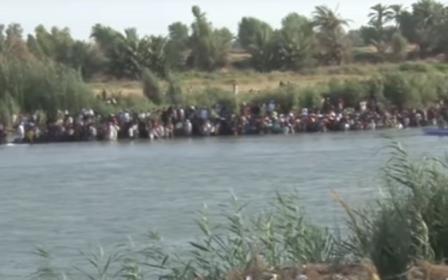Fallujah Escape: Families pay $100-a-head to IS militant - to flee his group

BAGHDAD – It was just a few metres that separated life from death as they fled.
“In real life, you don't count these silly metres,” Ahmad Jassim, whose cousins were among those trying to escape and falling short, told Middle East Eye on Saturday.
“But when life turns out to be a big stupid tragedy, you need to account for every single centimetre,” he said.
More than 100 families have attempted to flee Islamic State (IS) group-held Fallujah as Iraqi security forces advanced towards the centre and fighting intensified this week.
On Thursday, a group of three families walked several kilometres from the heart of the city towards its southern outskirts, where the Iraqi security forces were located, several sources told MEE,
Held by IS for more than 29 months, Fallujah is the objective of a major Iraqi security offensive launched on 22 May and involving 30,000 Iraqi soldiers backed by multi-sect paramilitary troops and US-led coalition air power.
Only about 50km from Baghdad, Fallujah would be the third city, after Ramadi and Tikrit, to be recaptured from the militant group that has seized large sections of the country.
But as Iraqi forces advance, the city’s residents are squeezed ever tighter between the front lines and their militant captors.
"Daesh (an Arabic name for IS) has been using civilians to gain more time. As long as there are civilians inside, we cannot push hard," said a senior Iraqi military officer involved in the battle who declined to be identified.
The families attempting to escape on Thursday were even guided by a member of IS, who was paid $100 per person, and yet few escaped alive.
"We had walked for hours. The guide led us along sewers all the time," said Ra'ad Mohammed, one of the survivors, who talked to MEE from Amiriyat al-Falluja Camp, where he has now relocated.
“There were no more than few metres remaining to reach the Iraqi forces and safety.”
Suddenly, out of the darkness, Ra’ad said, gunfire came “from everywhere”.
“Women and children were screaming and men were telling them to jump into the sewer," Ra'ad said, crying softly as he spoke. "I jumped in, I thought my family was in the water so I jumped, but they kept firing at us.”
Iraqi troops progress
Fallujah is the oldest IS stronghold in Iraq, the first city taken by the militants, late in December 2013.
Iraqi troops have made good progress and no more than a kilometre now separates them from the centre of the city, military sources told MEE.
However, their advance has been slowed by thousands of booby traps, roadside bombs and snipers, as well as ditches filled with water and dirt embankments that the militants have built up around the city to hinder the approach of the troops and also to trap tens of thousands of civilians inside.
The escaping families, several sources told MEE, had to cross a wide sewer and a high earth barricade to reach safety.
Iraqi military officers told MEE that at least 24 people were massacred in the incident, and that only a few members of the three families survived.
Jassim and Ra’ad said that most of their relatives were either wounded, recaptured by IS militants or missing.
"Dozens of men and women jumped into the sewer as I did. Several of them were wounded as Daesh was randomly firing at them. Many were wounded and couldn't make it up and over the dirt embankment," Ra'ad said.
He waited more than two hours, concealed in the sewer, until the IS militants finally left the area. He carried a wounded man on his shoulders and climbed the hill to safety.
"There was a women next to me. She was wounded. She was trying to climb the hill but because she was very heavy, she could not make it and I wasn’t able to help," Ra'ad said.
"I asked them [Iraqi security forces] to attack the area. To come with me, to go back, but they said no and did not let me go back," Ra'ad said, with difficulty.
"Can you imagine how you would feel if you lost 25 members of your family and there were two kids on your arms asking about their mother," Ra'ad said, referring to his two children, who were saved by one of his cousins.
The incident was not the first of its kind: IS has been shooting whoever tries to leave the city. Many people were also shot dead in northern Fallujah while trying to cross the Euphrates River.
Last week, the UN mission in Iraq warned of IS's attempts to use civilians as "human shields".
On Sunday, the Norwegian Refugee Council said that the Iraqi army had managed to establish a safe corridor that allowed 4,000 Fallujah residents to flee in 24 hours.
So in spite of the dangers, more than 24,000 people have escaped the city so far, according to the UN. Still, more than that remain trapped inside, an Iraqi security officer told MEE.
"The militants know they have no egress, no way out of the city, so it’s a matter of time before we get in and kill all of them," the officer said. "The civilians are their lifeline, giving them a few extra days, but no more than that."
Stay informed with MEE's newsletters
Sign up to get the latest alerts, insights and analysis, starting with Turkey Unpacked
Middle East Eye delivers independent and unrivalled coverage and analysis of the Middle East, North Africa and beyond. To learn more about republishing this content and the associated fees, please fill out this form. More about MEE can be found here.




